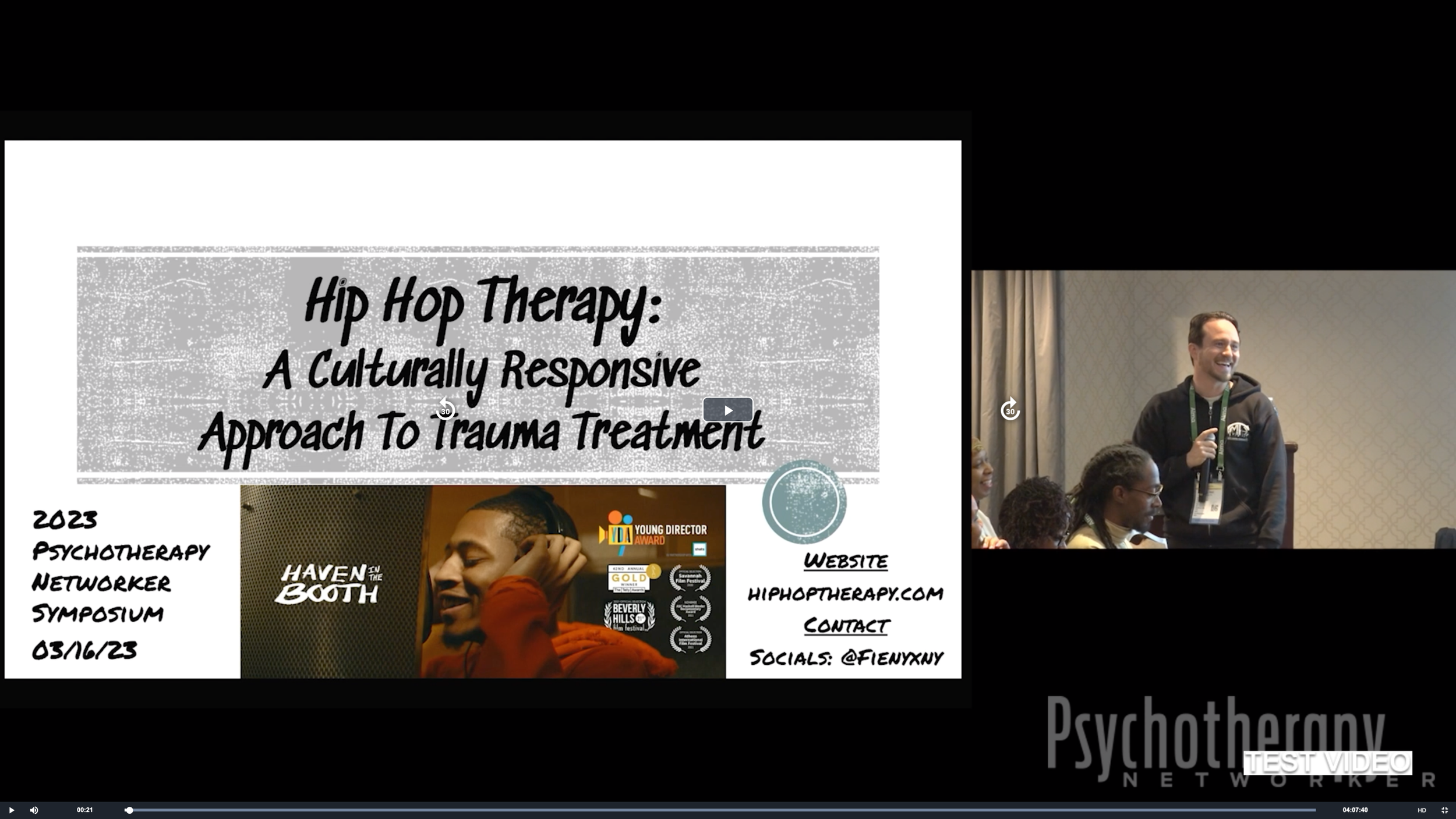Hip Hop Therapy is…
a contemporary approach to mental health treatment that utilizes Hip Hop culture as a therapeutic medium. Rooted in the social work tradition, HHT is a strengths-based, culturally competent framework focused on fitting the model to the client. Although Hip Hop has always fundamentally been therapeutic, much like the creative process itself, Dr. Edgar Tyson (1998) was the first to coin the phrase “Hip Hop therapy” and systematically integrate the culture into a clinical setting. In 1996, while working in a residential facility for abused and homeless youth in Miami-Dade county, Tyson (1998) was inspired to incorporate the culture he and his clients identified with into his approach as a social worker. Upon witnessing profound results, Tyson decided to formally study the model’s implementation, which would later be expounded upon in his pioneering article in 2002.
Dr. Tyson presenting at the 2016 Coalition of Juvenile Justice's National Disproportionate Minority Contact Conference in Baltimore, MD.
After conducting his initial study in 1997, Tyson presented his model at the 30th Annual Conference of the National Association of Black Social Workers in 1998 (Tyson, 2002). Tyson (1998) would also present that year at the 20th Annual Symposium for the Association for the Advancement of Social Work with Groups, which would serve as a guide for Ciardiello’s (2003) innovative implementation of HHT, where the therapeutic act of creating different aspects of the culture was introduced to the literature. According to Tyson (2002), the most significant finding of his exploratory study was that most of the youth expressed the desire to create their own songs to share and discuss in group, which he would then facilitate. Ciardiello (2003) effectively built off of this implication for further research, as have several others since. Other notably pioneering practitioners integrating rap music into psychoeducational and psychotherapeutic interventions include Dr. Jaleel Abdul-Adil, Dr. Alonzo DeCarlo, and Dr. Don Elligan.
Although Tyson’s (1998) intervention focused specifically on rap music, he emphasized that it “must be understood as one component and within the larger context of the hip hop culture,” which he referred to as the “central mechanism of HHT” (2002, p. 134). Built within his founding model is the understanding that the music is but one artifact of a much larger culture and therefore cannot be analyzed in isolation. Hence, Hip Hop therapy represents the prospective inclusion of each cultural facet into the therapeutic process (Hall, 2016). This is a key distinction that separates HHT from other rap music interventions, such as Elligan’s (2000) contemporaneous Rap Therapy.
Graffiti by the legendary Cope2.
Based on this understanding of the Hip Hop gestalt, J.C. Hall began developing his Hip Hop Expressive Arts Therapy (HEAT) model in 2011 under the tutelage of Dr. Tyson, drawing parallels between Hip Hop therapy and expressive arts therapy. Expressive arts therapy is a synthesis of the expressive or creative arts therapies (music, poetry, dance, art, etc.), and its intermodal nature distinguishes it as an entity separate from the sum of its parts. It is characterized by the purposeful use of various artistic mediums in treatment, transitioning freely between forms of expression to aid in deeper exploration and promote individual growth, community development and transformative healing (IEATA, 2017).
Within the overarching framework of Hip Hop therapy, HEAT is a model that emphasizes the inherent inseparability of Hip Hop’s cultural components. It also seeks to elucidate the overlap between elements and the importance of incorporating diverse modes of sensory experience for the sake of therapeutic efficacy (Hall, 2016). For example, when writing, recording and performing a song, or partaking in what Hall (2013) first referred to as Recording And Performing Arts Therapy (RAP Arts Therapy), an individual is engaging in various expressive mediums, from poetry and music to drama and movement. A broad demonstration of this intentional application of the interplay of the arts (i.e. poetry, music, drama, movement, film) can be seen in the music video created with a studio participant at the end of the first school year of Hall’s current program (Brook, 2014), as well as more recently (M Flizz, 2020).
Hall is working on publishing a study detailing the theory behind HEAT and the results of its implementation, which will be an expanded version of a chapter he was contributing to Dr. Tyson’s textbook on Hip Hop therapy. Dr. Tyson passed away suddenly before the book was completed, and Hall hopes to publish it on his behalf in the near future with the help of his family and loved ones.
Below are recent workshops and interviews Hall has done expounding upon HHT and the legacy of his mentor.
Dr. Edgar Tyson and J.C. Hall in the award-winning short documentary Mott Haven.
Workshops
Trauma Research Foundation (2025)
Psychotherapy Networker Symposium (2023)
Trauma Research Foundation (2021)
Podcasts
The Trauma Therapist Podcast (2024)
NASW Social Work Talks (2023)
Hip Hop Therapy in the South Bronx
Be You with Michael Arrington (2023)
Healing Through Hip Hop
Exploring the Power of Music as a Therapeutic Tool with JC Hall and Brittani Williams
Be You with Michael Arrington (2022)
Hip Hop Therapy
The Power of Narrative, Depth Psychology, Shadow Integration and Parts Work
Hip Hop Can Save America (2021)
Hip Hop x Therapy
Arts for the Health of It (2021)
Hip Hop Therapy with J.C. Hall










